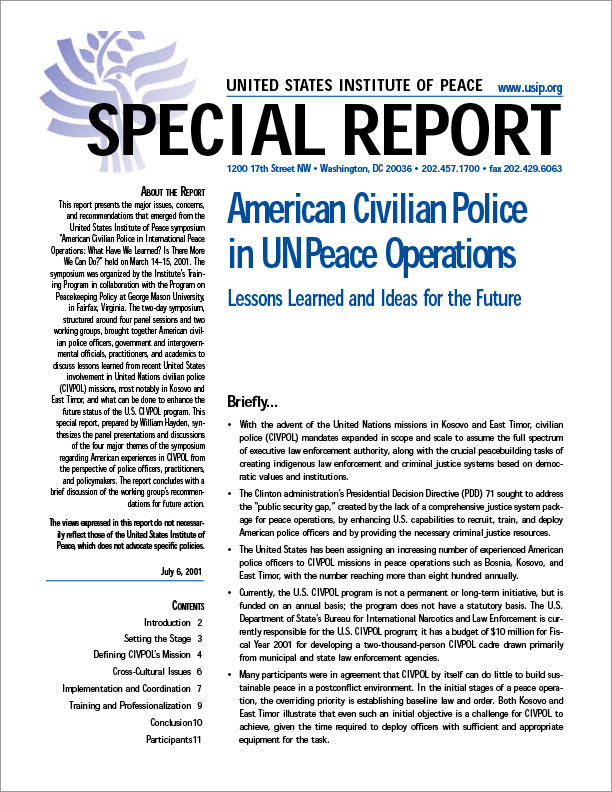
Summary
- With the advent of the United Nations missions in Kosovo and East Timor, civilian police (CIVPOL) mandates expanded in scope and scale to assume the full spectrum of executive law enforcement authority, along with the crucial peacebuilding tasks of creating indigenous law enforcement and criminal justice systems based on democratic values and institutions.
- The Clinton administration's Presidential Decision Directive (PDD) 71 sought to address the "public security gap," created by the lack of a comprehensive justice system package for peace operations, by enhancing U.S. capabilities to recruit, train, and deploy American police officers and by providing the necessary criminal justice resources.
- The United States has been assigning an increasing number of experienced American police officers to CIVPOL missions in peace operations such as Bosnia, Kosovo, and East Timor, with the number reaching more than eight hundred annually.
- Currently, the U.S. CIVPOL program is not a permanent or long-term initiative, but is funded on an annual basis; the program does not have a statutory basis. The U.S. Department of State's Bureau for International Narcotics and Law Enforcement is currently responsible for the U.S. CIVPOL program; it has a budget of $10 million for Fiscal Year 2001 for developing a two-thousand-person CIVPOL cadre drawn primarily from municipal and state law enforcement agencies.
- Many participants were in agreement that CIVPOL by itself can do little to build sustainable peace in a postconflict environment. In the initial stages of a peace operation, the overriding priority is establishing baseline law and order. Both Kosovo and East Timor illustrate that even such an initial objective is a challenge for CIVPOL to achieve, given the time required to deploy officers with sufficient and appropriate equipment for the task.
- Former CIVPOL participants from the United States stressed that establishing organizational command and control structures early on or even before deployment, along with a personnel ranking system, would greatly facilitate the speedier and more effective deployment of CIVPOL in the field.
- All the American officers and many participants agreed that the desired end state of a CIVPOL mission is a self-sustaining indigenous criminal justice system based on democratic policing principles and the protection of human rights.
- Cross-cultural issues in multinational peace operations are very sensitive, not only within and among the mission's civilian and military components, but also between those components and the local population. The multinational composition of a UN CIVPOL mission can create many obstacles to effective law enforcement action.
- The symposium's American CIVPOL participants agreed that operational challenges were the most significant barrier to setting up an interim law enforcement presence in a peace operation. The U.S. officers emphasized that, absent an international program that facilitates organization, as well as training and coordination for different national contingents prior to deployment, they themselves had to invest considerable time, effort, and resources in the field to forge a standardized and unified team composed of civilian police from the United States and a variety of other countries.
- A number of participants voiced support for such ideas as Congress's taking action to give the U.S. CIVPOL program a statutory basis, creating a reserve force in which officers would be deputized federal agents, or establishing a standing "gendarmerie"-type paramilitary capacity (such as that found in France, Italy, or Spain) to be used exclusively for CIVPOL operations.
- In Bosnia, East Timor, and Kosovo, American officers generally have earned a professional reputation and are looked to for leadership and solid policing expertise.
- Enhancing public perception and understanding of CIVPOL and the role of American officers must take place to propel CIVPOL to a greater level of importance as a peacekeeping and peacebuilding tool.
About the Report
This report presents the major issues, concerns, and recommendations that emerged from the United States Institute of Peace symposium "American Civilian Police in International Peace Operations: What Have We Learned? Is There More We Can Do?" held on March 14-15, 2001. The symposium was organized by USIP's Training Program in collaboration with the Program on Peacekeeping Policy at George Mason University, in Fairfax, Virginia. The two-day symposium, structured around four panel sessions and two working groups, brought together American civilian police officers, government and intergovernmental officials, practitioners, and academics to discuss lessons learned from recent United States involvement in United Nations civilian police (CIVPOL) missions, most notably in Kosovo and East Timor, and what can be done to enhance the future status of the U.S. CIVPOL program. This special report, prepared by William Hayden, synthesizes the panel presentations and discussions of the four major themes of the symposium regarding American experiences in CIVPOL from the perspective of police officers, practitioners, and policymakers. The report concludes with a brief discussion of the working group's recommendations for future action.
The views expressed in this report do not necessarily reflect those of the United States Institute of Peace, which does not advocate specific policies.